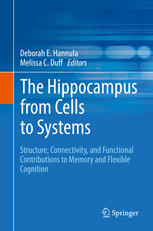

Most ebook files are in PDF format, so you can easily read them using various software such as Foxit Reader or directly on the Google Chrome browser.
Some ebook files are released by publishers in other formats such as .awz, .mobi, .epub, .fb2, etc. You may need to install specific software to read these formats on mobile/PC, such as Calibre.
Please read the tutorial at this link: https://ebookbell.com/faq
We offer FREE conversion to the popular formats you request; however, this may take some time. Therefore, right after payment, please email us, and we will try to provide the service as quickly as possible.
For some exceptional file formats or broken links (if any), please refrain from opening any disputes. Instead, email us first, and we will try to assist within a maximum of 6 hours.
EbookBell Team

0.0
0 reviewsThe hippocampus has long been considered a critical substrate in the neurobiology, neuropsychology, and cognitive neuroscience of memory. Over the past few decades, a number of ground-breaking theoretical and methodological advances have radically enhanced our understanding of the structure and function of the hippocampus and revolutionized the neuroscientific study of memory. Cutting across disciplines and approaches, these advances offer novel insights into the molecular and cellular structure and physiology of the hippocampus, the role of hippocampus in the formation, (re)consolidation, enhancement, and retrieval of memory across time and development, and permit investigators to address questions about how the hippocampus interacts, functionally and anatomically, with other neural systems in service of memory. In addition, recent investigations also suggest that the mechanistic properties and functional processing features of the hippocampus permit broader contributions to cognition, beyond memory, to the domains of attention, decision-making, language, social cognition, and a variety of other capacities that are critical for flexible cognition and behavior. These advances have profound implications for the neurobiology and cognitive neuroscience of hippocampus dependent cognition and for the numerous psychiatric and neurological diseases and disorders for which hippocampal pathology is a hallmark such as Alzheimer’s disease and schizophrenia.
The goal of this book is to bring together in a single source an integrated review of these advances providing state of the art treatment on the structure and function of the hippocampus. Contributors will examine the hippocampus from a variety of levels (from cells to systems) using a wide range of methods (from neurobiological approaches in non-human animals to neuroimaging and neuropsychological work in humans).